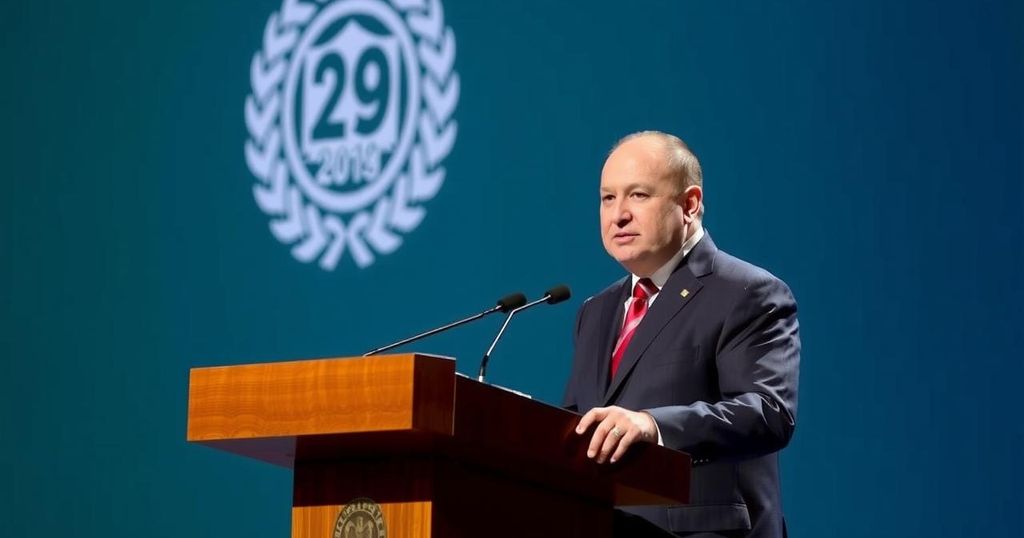President Ilham Aliyev’s statements at COP29 in Baku criticized Western nations and asserted Azerbaijan’s fossil fuel advocacy, leading to criticism about the country’s commitment to the climate agenda. His confrontational tone has exacerbated diplomatic tensions with Europe, while the state-owned energy company SOCAR was highlighted for poor environmental practices amid allegations of greenwashing.
At COP29 hosted in Baku, Azerbaijan, President Ilham Aliyev has drawn significant scrutiny due to his combative rhetoric and outspoken support for fossil fuels, overshadowing the conference’s climate agenda. His remarks have raised doubts regarding Azerbaijan’s dedication to genuine climate action, especially given that he vehemently criticized Western nations and accused France and the Netherlands of neocolonialism. Concurrently, he promoted Azerbaijan’s fossil fuel industry as indispensable, proclaiming these resources a “gift from God” while downplaying the urgency for environmental reform.
The controversy escalated when Aliyev publicly lambasted Western hypocrisy and the actions of European institutions, provoking diplomatic tensions with France and other nations. His comments sparked outrage among European representatives, with French Minister Agnès Pannier-Runacher declaring them “unacceptable”. Subsequently, both the French Foreign Ministry and Azerbaijan’s Foreign Ministry engaged in a diplomatic tit-for-tat by summoning each nation’s ambassador.
Aliyev’s stance seems to serve dual purposes: promoting Azerbaijan’s energy resources while simultaneously leveraging the climate summit to address broader geopolitical grievances. His overt hostility toward certain European countries coincides with Azerbaijan’s recent geopolitical maneuvers in the South Caucasus, particularly after its military actions in Nagorno-Karabakh. Despite calls from civil society for a more authentic approach, Aliyev has dismissed criticisms, boasting about the conference’s participation and dismissing the legitimacy of boycotters.
Furthermore, Azerbaijan’s state-owned energy company, SOCAR, faced criticism for its lack of adherence to social and climate standards amid claims of utilizing the COP climate talks for greenwashing. Aliyev’s rallying cry that “72,000 registered participants from 196 countries” signify widespread support for Azerbaijan stands in stark contrast to the country’s documented human rights violations. Notably, the detainment of a significant number of journalists and activists in Azerbaijan raises questions about the country’s commitment to democratic values alongside its climate ambitions.
The backdrop of COP29 in Baku sees President Ilham Aliyev navigating between international environmental responsibilities and a powerful fossil fuel industry domestically. Azerbaijan’s economy relies heavily on oil and gas, leading to significant challenges in aligning national interests with global climate goals. Aliyev’s confrontational approach toward Western nations surfaced in the wake of escalating political tensions, particularly surrounding Azerbaijan’s actions in the South Caucasus. These dynamics frame the ongoing climate discourse at COP29, complicating the country’s role as a host nation amid critiques of its environmental practices and overall political climate.
In summary, President Ilham Aliyev’s rhetoric at COP29 has raised significant concerns about Azerbaijan’s genuine commitment to climate action. His confrontational speech not only alienated European diplomats but also highlighted ongoing geopolitical tensions. The focus on fossil fuel advocacy amid human rights criticisms further complicates Azerbaijan’s position as a climate leader, suggesting that the current summit might be leveraged more for political purposes than for substantive environmental progress.
Original Source: www.euractiv.com






